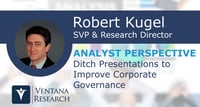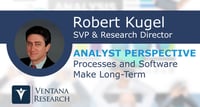The annual Oracle OpenWorld user group meeting provides an opportunity to step back and take a longer view of business, industry and technology trends affecting the company. Last year, after listening to Larry Ellison’s and Mark Hurd’s vision for the future of IT, I wrote that Oracle had to continue shifting its focus to business applications because the accelerating shift to cloud computing would lead corporations to outsource their IT infrastructures, services and security to third parties....
Read More
Topics:
Big Data,
Performance Management,
SaaS,
ERP,
Office of Finance,
Analytics,
Cloud Computing,
PaaS,
Digital Technology
The topic of corporate governance received renewed attention recently after the publication of an open letter signed by 13 prominent business leaders, including Warren Buffett of Berkshire Hathaway and Jamie Dimon of JPMorgan Chase. The first principle the group advocated in the letter is the need for a truly independent board of directors. To achieve that aim, the letter suggests having the board meet regularly without the CEO and that the members of the board should have “active and direct...
Read More
Topics:
Mobile,
Governance,
Human Capital Management,
Office of Finance,
Consolidation,
Reconciliation,
CFO,
CEO,
board of directors,
accounting close
Effective capital planning and capital investment are vital to a company’s long-term success. The choices a company makes in this regard – how much to invest and in which facilities or projects – almost always have a profound impact on its competitiveness and performance. Because they have limited financial resources, well-managed companies take pains to ensure that these decisions support their long-term strategies and are made as rationally as possible. To do this they must have a disciplined...
Read More
Topics:
Office of Finance,
finance,
Business












